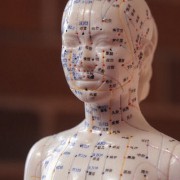 Photo: Getty Images
Photo: Getty Images
Traditional Chinese medicine (TCM) considers any type of sleep disturbance to be a branch, or symptom, of an underlying problem. TCM focuses on the root of the disturbance, which would be an imbalance of blood, qi, jing, shen, yin or yang.
The root may also involve one or more of the major organ systems which are heart, kidneys, liver, lungs and spleen. Traditional Chinese medicine will take into consideration whether there may be a deficiency or an excess of qi (your body's energy) in the organs, especially in the heart and kidneys.
The kidneys are seen as storehouses for energy. Sleep disorders can arise when the kidneys are not able to store energy adequately.
Qi deficiency is from the blood, and from deficiencies of yin (passive energy) in the heart, kidneys, liver and spleen. Qi deficiency can be treated by stabilizing qi, restoring the blood and nurturing the yin.
An excess of qi points to stagnant liver qi, which can cause an assortment of stomach disorders. Excess qi is treated by clearing the liver and bringing balance to the stomach and the mind.
According to the Meridian Theory of TCM the body can stay well as long as your organs are working harmoniously together and your qi is flowing freely through your meridians.
Meridians are channels in your body through which your qi flows. There are 12 meridians, and each one relates to its own organ system.
Anxiety is believed to be linked to the heart meridian. Anger and stress bring disturbance to the liver meridian. Worry disrupts the spleen meridian.
The shen (mental, emotional and psychological energy) can be disturbed by excessive emotion of any type. This can result in sleep disorders.
Traditional Chinese medicine recommends making some lifestyle changes. Go to bed at a regular bedtime, and keep your sleeping space dark and quiet.
Reducing or eliminating stimulants like caffeine, tobacco and sugar protects the yin from further depletion. Avoiding foods that are overly sweet or greasy decreases fluid retention and phlegm in the stomach. Stomach qi will then come back into balance and sleep will improve.
Traditional Chinese medicine uses acupuncture and Chinese herbs to treat insomnia, working with your qi, rather than treating symptoms. The energy practice of qi gong may be used to bring the kidneys back into balance, and sleep health can then also be restored.
Research indicates that acupuncture can stimulate the central nervous system to increase production of some neurotransmitters like serotonin, as well as increasing endorphin production. This helps the patient to relax, easing tension and discomfort. Sleep then becomes easier to achieve.
Resources:
Insomnia: How Chinese Medicine can help you sleep
http://harmonyandhealthacupuncture.com/insomnia-how-chinese-medicine-can-help-you-sleep
Chinese medicine on insomnia
http://sleepnosleep.wordpress.com/2010/04/27/chinese-medicine-on-insomnia
Traditional Chinese Medicine For Insomnia
http://www.tcmpage.com/hpinsomnia.html
Alternative and Integral Therapies for insomnia
http://www.holisticonline.com/remedies/sleep/sleep_ins_TCM.htm
What Is Traditional Chinese Medicine?
http://www.tcmworld.org/what_is_tcm
Visit Jody's website and blog at http://www.ncubator.ca and http://ncubator.ca/blogger





Add a CommentComments
There are no comments yet. Be the first one and get the conversation started!